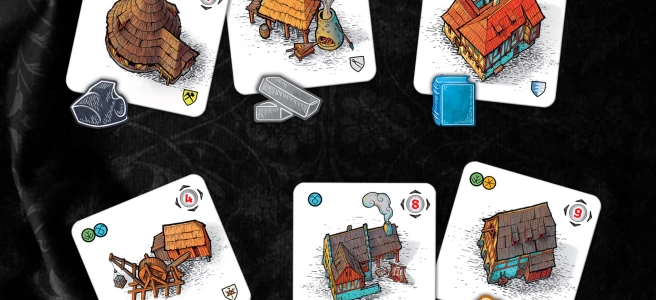 In our last article, we took a deep dive into mining and the role it plays in both the city’s history and our upcoming game alike. Today, we have a special treat — a designer diary article written by Kutná Hora co-designer Ondřej Bystroň that sheds more light on the asymmetrical guilds in the game, where they come from historically, and how they factor into the experience. Enjoy!
In our last article, we took a deep dive into mining and the role it plays in both the city’s history and our upcoming game alike. Today, we have a special treat — a designer diary article written by Kutná Hora co-designer Ondřej Bystroň that sheds more light on the asymmetrical guilds in the game, where they come from historically, and how they factor into the experience. Enjoy!
Ondřej writes:
The whole idea of asymmetrical guilds is connected to the concept of the dynamic economy. The inspiration for having a dynamic economy came at the very beginning of development, when I was looking at a historical illuminated manuscript depicting Kutná Hora’s silver economy and thinking about how to turn it into game mechanics. Everything in the painting was clear. Miners, ore smelting, workers in mint…and it made sense. However, I was especially intrigued by the group of people sitting around the table who were checking the ore presented to them. Who were they? What was their purpose?
As it wasn’t easy to find an answer, I picked up the phone and called the Museum of Silver in Kutná Hora and asked. I was lucky, as that was during the time of COVID lock downs and the museum was closed to the public. So, the museum director was generous enough to explain all events happening in the illumination.
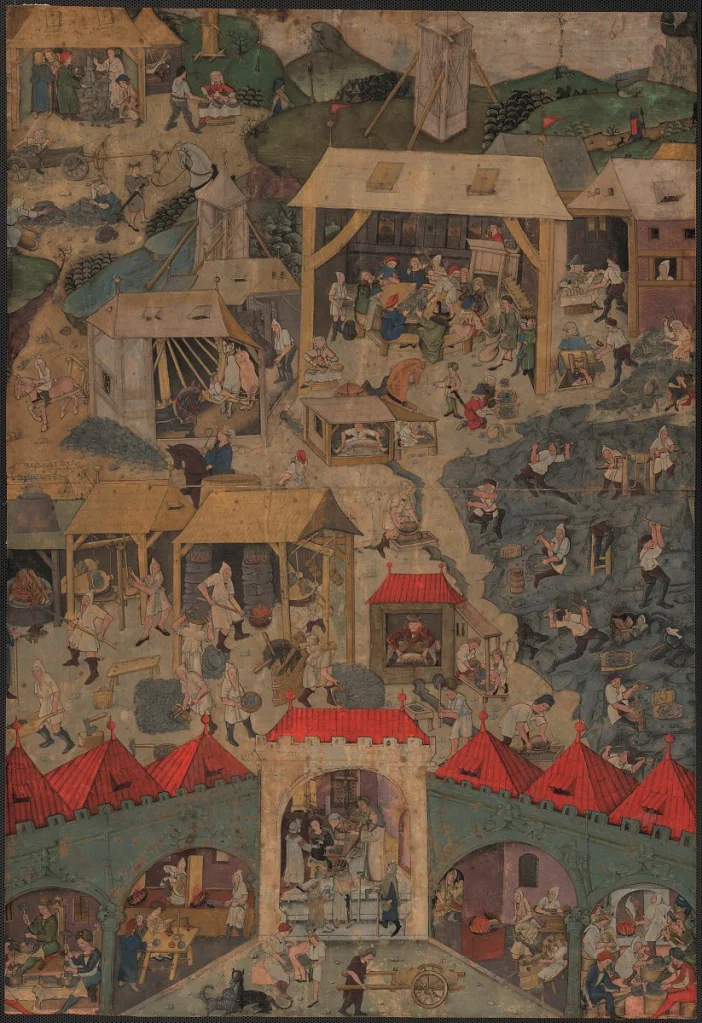 Image copyright: GASK – Sbírka Galerie Středočeského kraje, Kutná Hora – used with permission
Image copyright: GASK – Sbírka Galerie Středočeského kraje, Kutná Hora – used with permission
It turned out those dudes in fancy cloth were silver ore merchants, buying ore for their own smelters or for further resale. The whole trading operation was organized as a blind auction. Merchants checked the quality of ore, and after that they whispered their offer to the seller, who then decided on whom to sell to. And the part where my head exploded? They were called “Masters of Whispers.”
It was decided. The game won’t be just another city building game. There will be a dynamic economy – with a real supply and demand system. That’s where the different guilds entered the picture.
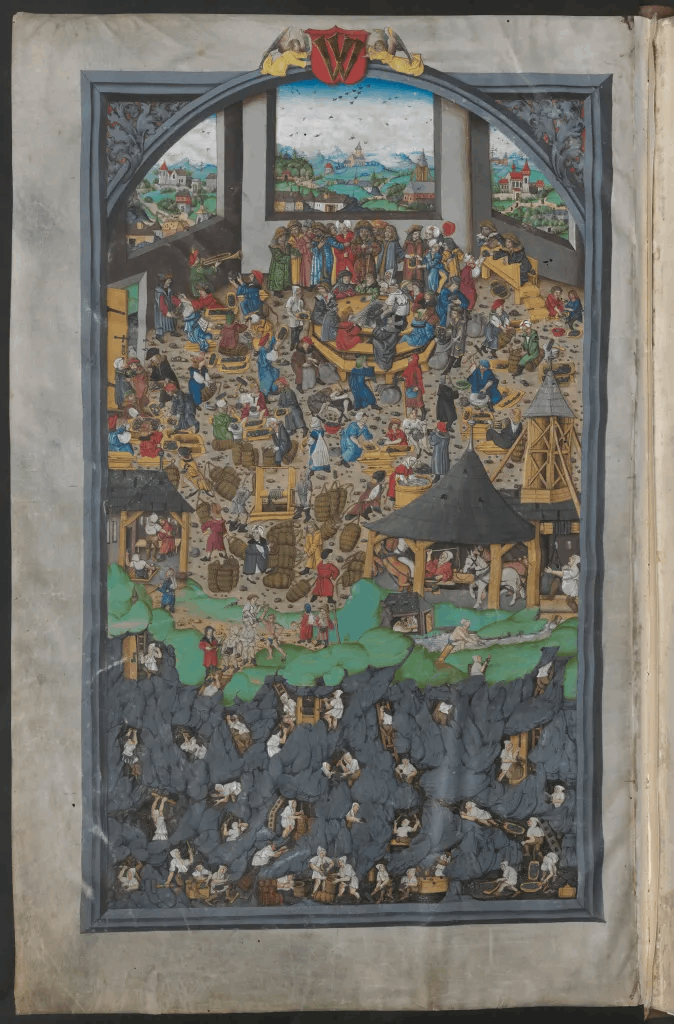 Copyright: Wien, Österreichische Nationalbibliothek – used with permission
Copyright: Wien, Österreichische Nationalbibliothek – used with permission
The evolution of guilds
First, we just had Miners and Metallurgists, as this was the core Kutná Hora economy. At that moment, we have decided to link the price of those commodities – silver ore and silver ingots. That made perfect sense. The more silver there was, the lower the price and vice versa. It has stayed like that even until today.
Of course – the more I’ve read, the more I wanted to make the game more realistic. Mining buildings were just wooden constructions that enabled workers to operate under the surface, and this is how they are in the game. They’re the cheapest of all, and they enable mine construction. On the other hand – Metallurgists had to build more technically advanced structures, especially smelters. And they are doubly expensive. The interesting thing this creates in the game is that you must always balance between the inflow of ore and Metallurgists plants available to process it. The price of ore varies a lot.
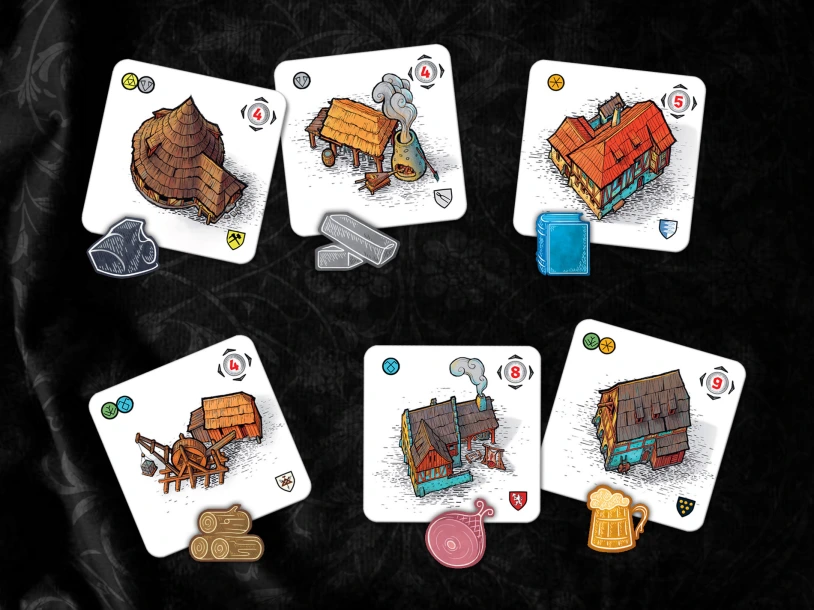 Right after that came Scribes. Administration in Medieval Europe was surprisingly important. The absence of central government and universal rights created lots of specific legal situations. One was allowed to sell some goods in one town but not in another. Having a court in the town meant that citizens could better self-rule. If that didn’t exist, towns had to rely on external authorities, and nobody liked that. Eventually the King invited Italian lawyers to Kutná Hora and asked them to prepare the Royal Mining Law in 1300. The curious thing is that this law was used throughout the coming centuries and was canceled only in 1854.
Right after that came Scribes. Administration in Medieval Europe was surprisingly important. The absence of central government and universal rights created lots of specific legal situations. One was allowed to sell some goods in one town but not in another. Having a court in the town meant that citizens could better self-rule. If that didn’t exist, towns had to rely on external authorities, and nobody liked that. Eventually the King invited Italian lawyers to Kutná Hora and asked them to prepare the Royal Mining Law in 1300. The curious thing is that this law was used throughout the coming centuries and was canceled only in 1854.
In our game, Scribes are connected to the production of ore, as the main need for administration in Kutná Hora came from mining. Kings simply didn’t want to be cheated. Nevertheless, the price of “booking” is important for all. Everybody is buying the “rights to build” or mining, and for that you must pay an administration fee — which is connected to ore production and compared to the number of scribes in the city.
Historically, in medieval towns each profession would have its own guild. You weren’t allowed to perform your profession unless you were a member of the guild. At the same time – guild membership was strictly regulated. This is another element that we brought into the game. If there are not enough customers for a specific commodity, you are not allowed to build another guild facility.
After integrating miners, metallurgists, and scribes to game, we were at a crossroads. In bigger towns, specialization would go ad absurdum. In Prague, even needle makers had their own guild, and at the peak of guild organization there were around 200 different guilds. Somehow, we felt that 200 guilds in a euro game might be slightly more complex than the average euro gamer would appreciate. So, we had to choose.
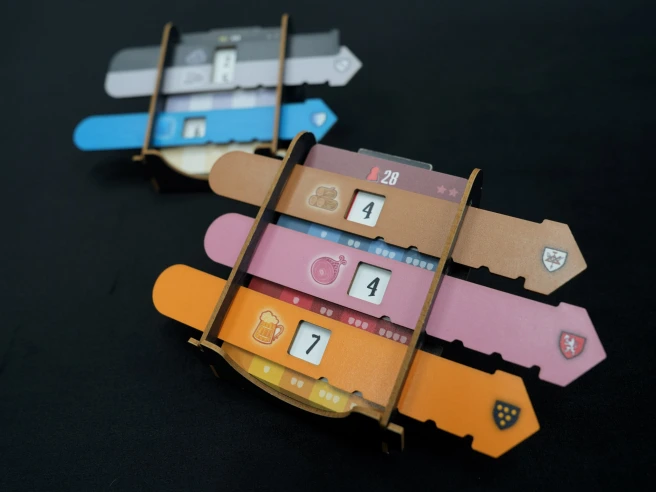 Builders were no brainer. As the city and mines are expanding, there is a huge need for skilled builders. We know from historical records that even Parler’s workshop moved to Kutná Hora. Builders are not directly connected to mining, rather to the growth of population. The more people there are in the city, the bigger the need for housing, the more expensive buildings became.
Builders were no brainer. As the city and mines are expanding, there is a huge need for skilled builders. We know from historical records that even Parler’s workshop moved to Kutná Hora. Builders are not directly connected to mining, rather to the growth of population. The more people there are in the city, the bigger the need for housing, the more expensive buildings became.
This guild offers interesting decisions that can be hard for certain types of players. By building new workshops you are decreasing the price of building not only for yourself, but also for all others. Some players can’t overcome that fact, and don’t progress in the guild — shooting themselves in the foot in the process. On the other hand, nothing beats the feeling when your opponent’s spend a fortune for construction, and you, as a builder, decrease the price in next turn to benefit yourself.
Grocers and Innkeepers are tied to the population of the city. As explained in the dynamic economy post, the more people there are, the higher the yield. And when there are not enough people, nobody is buying your beer.
That idea was even more apparent during development. When there were too many pubs and too few customers, your income was just miserable. We have balanced it a bit, but believe me, you are going to feel it if your pubs are empty. Innkeepers are important from a lore perspective, too. They represent fun in the city and fun there was. So much, that there was a long fight over the jurisdiction of city spa houses – largely due to taxes.
In the game, Grocers and Innkeepers stand for the prosperity of the city. They show the transformation from a purely industrial town to a service economy. And therefore, they were connected to the most apparent proof of the city’s prosperity: St. Barbara. By advancing in those guilds, you are also advancing the construction of the city’s main temple.
How do you benefit from that? That we are going to explain in another article soon enough!


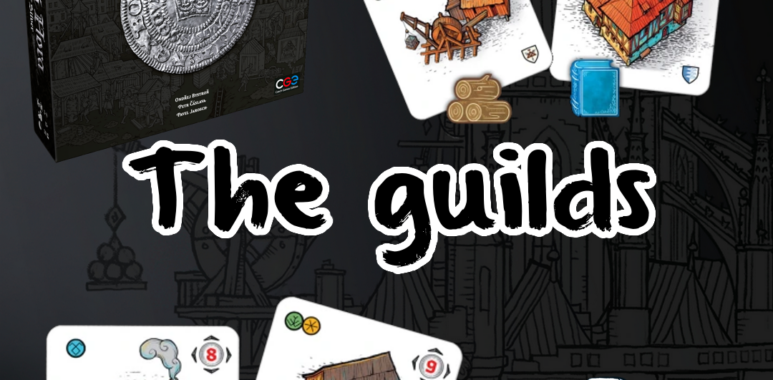
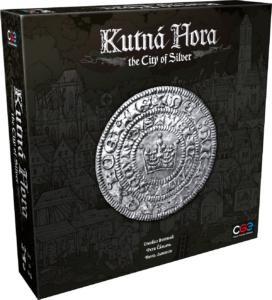 Kutná Hora: The City of Gold is a historical building Eurogame for 2–4 players from 13 years. A game lasts 60–120 minutes. It contains 1 Main board, 1 Supplementary board for the buildings offer, 4 Dual layer player boards, 2 stands for the market decks, St. Barbara tiles, Guild tiles, building tiles, Mine tiles, Councilor tokens, Cardboard coins, Action cards, Market cards, Setup cards, Set of tokens for each player (buildings, mines, plots, points, reputation, and production trackers), 1 Rulebook and Reference sheets for each player. You can
Kutná Hora: The City of Gold is a historical building Eurogame for 2–4 players from 13 years. A game lasts 60–120 minutes. It contains 1 Main board, 1 Supplementary board for the buildings offer, 4 Dual layer player boards, 2 stands for the market decks, St. Barbara tiles, Guild tiles, building tiles, Mine tiles, Councilor tokens, Cardboard coins, Action cards, Market cards, Setup cards, Set of tokens for each player (buildings, mines, plots, points, reputation, and production trackers), 1 Rulebook and Reference sheets for each player. You can